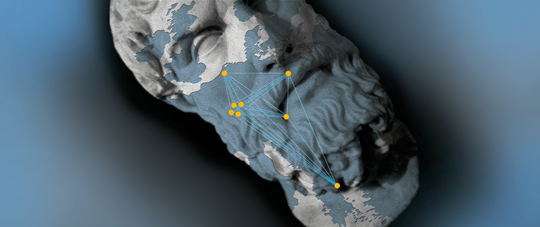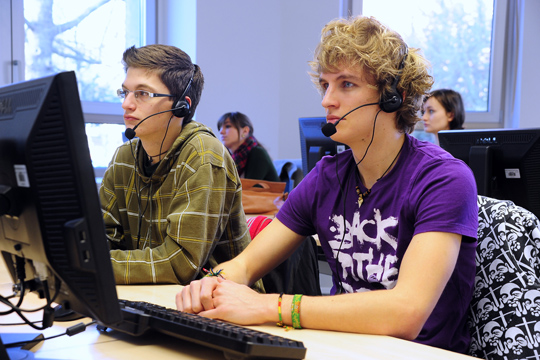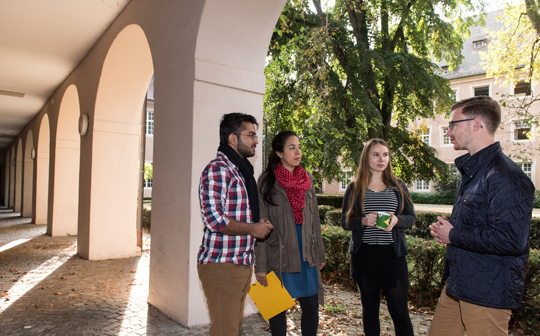European teaching for the next generation
Freiburg, Mar 29, 2019
This is about nothing less than the future of teaching on this continent - the European Union is calling for all institutions of higher education to work out new learning formats through dialogue. Models for twelve “European Universities” are to be developed by 2024. Along with seven other partners, the University of Freiburg has applied - as part of the EPICUR consortium. Yet Freiburg’s vision of a European University goes far beyond teaching.
 The philosopher Epicurius has given a name to the new EPICUR consortium comprising eight universities in six countries.
The philosopher Epicurius has given a name to the new EPICUR consortium comprising eight universities in six countries.
Photos: Chriso, Entelechie/stock.adobe.com, Montage: Jürgen Oschwald
Many were wary of Epicurus. To his famous ancient contemporaries, who read his works with a critical eye, he was no philosopher, but a disreputable scoundrel. They claimed he was preaching eros and excess, back at the end of the third century BCE. Lust, according to Epicurius, was the “origin and aim of a happy life.” Greater hedonism than that hardly seems possible. As late as the Middle Ages and the Early Modern Period, the term “epicurian” - particularly on the lips of Christian clerics - was generally a derogatory term for those who, like animals, followed their basest instincts.
Yet the centuries led to a rehabilitation of the great thinker. We now know that Epicurius’ teachings about lust were simply misunderstood. In him, many see the trailblazer for the idea of lifelong learning. And a man who upheld obeyance of the law, who did not encourage his students to rant and swagger, but to turn clever ideas into reality.
Decision in July
And it was likely this kind of forward thinking which inspired the eight universities to choose the name EPICUR for their new plan: European Partnership for an Innovative Campus: Unifying Regions – or EPICUR for short – is the name of the consortium which submitted its joint application to the European Universities Initiative in Brussels in late February 2019. The initiative, part of the European Union’s Erasmus+ program, is about nothing less than the future of teaching on the whole continent.
The EU is calling for all institutions of higher education to work out new learning formats through dialogue. Models for twelve “European Universities” are to be developed by 2024; and students attending them will benefit from a common education region and will not be held back by bureaucratic hurdles. The European Commission plans to disburse nearly 60 million euros to the selected pilot projects. The decision is to be made in July 2019.
270,000 students, six countries
In EPICUR, Freiburg is cooperating with three trusted partners in Eucor – The European Campus: The other participants are the French Universities of Strasbourg and Haute Alsace and the Karlsruhe Institute of Technology. The University of Basel, the fifth institution in the group, cannot throw its hat into the ring because Switzerland is not entitled to take part in a call for applications in the Erasmus+ program. But Freiburg has invited new allies in from four countries. The University of Amsterdam in the Netherlands, Adam Mickiewicz University in Poznań, Poland, Austria’s University of Natural Resources and Life Science Vienna, and Aristoteles University in Thessaloniki, Greece make up the rest of the consortium. If the plan succeeds, a virtual campus will be created with some 270,000 students in six countries.
 More digital teaching, linked with block courses, is meant to help as many students as possible to benefit from the services provided by the new education alliance.
More digital teaching, linked with block courses, is meant to help as many students as possible to benefit from the services provided by the new education alliance.
Photo: Thomas Kunz
With this call for applications, the EU appears to be responding like a seismograph to the political and social upheavals of recent years. The European project was once conceived as a guarantee of peace for a war-torn continent; yet now it is itself increasingly under fire, with a weakening currency and economy, a landscape of disparate member states, Brexit, a sudden upsurge in populism. “The future belongs to a common Europe,” says Professor Hans-Jochen Schiewer, Rector of the University of Freiburg. And common means - a virtual campus which brings together a new generation of Europeans: “We aim to train young people who will cross borders, disciplines, cultures and languages to tackle the big challenges facing Europe. European teaching is the foundation for the strengthening of a European identity.”
The heat beats for many subjects
Yet what is the vision of European teaching that EPICUR foresees? The application shifts the focus onto Liberal Arts and Sciences education, digital transformation of teaching methods, and the expansion of student mobility - among other things. Along with that, European languages and the various regional networks in which the universities are embedded comprise core areas of cooperation. “We want all students to benefit equally from EPICUR,” says Dr. Günter Schmidt-Gess, head of teaching development at the University of Freiburg.
That starts with common understanding, he says. No-one wants a Babel of languages. The eight institutions are planning a unified language policy, Schmidt-Gess reports. That applies to the basics underlying teaching, he says. “How should a university deal with students who speak different languages? Should it offer seminars, lectures, and exam regulations in English or in many languages from the very start?”
A teaching philosophy for Europe
Internationality and participation, for instance, are to be reinforced via an alternative credit point system rewarding activities which teach intercultural competence – such as learning a foreign language, organizing an excursion or hosting an exchange student. “It is a low-threshold way of demonstrating internationality. Not everyone can afford to do three internships abroad.” And more digital teaching, linked with block courses, is meant to help as many students as possible to benefit from the services provided by the new education alliance - such courses could include seminars in which students from several universities participate via video teleconferencing, and then later get to meet in person.
But Schmidt-Gess sees the chances offered by the Liberal Arts and Sciences (LAS) program as the very heart of EPICUR. LAS was launched in 2012 at the University of Freiburg’s University College and is taught in English; it is the first of its kind in Germany. “Now we aim to lift this teaching philosophy - which introduces the students in an interdisciplinary manner to the big ideas in politics, society and the environment - to the European level.” Until recently, Schmidt-Gess thought it was pie in the sky to think of offering an LAS program at all eight partner institutions. But, starting as early as 2020, students will be able to take individual modules which can ultimately earn them a European Track Certificate - the first step to the grand plan.
 Starting as early as 2020, students will be able to take individual modules which can ultimately earn them a European Track Certificate.
Starting as early as 2020, students will be able to take individual modules which can ultimately earn them a European Track Certificate.
Photo: Patrick Seeger
The fulcrum is where three countries meet
The current EU call for applications places teaching first and foremost at a European University, but Freiburg has a broader understanding of this concept, Rector Schiewer underscores: “Eucor – The European Campus is for us a tried and trusted model for a European University, whose outstanding strength in research, teaching, innovation and transfer shines an international light on the trinational economic region on the Upper Rhine.” But the alliance is far from having exhausted the potential of the region where three countries meet. On the contrary: The University of Freiburg aims to further expand its vision of a European University. “EUCOR is the stone we threw into the water, and now it is sending out concentric ripples.”
The proximity of the five German, French and Swiss universities is the trump card in this. While EPICUR is to be a largely digital campus, EUCOR is already a physical one, where researchers carry out joint projects and students commute from Freiburg to Basel or Strasbourg for lectures. In the future EUCOR is to offer its members even more: “We would like to institutionalize our vision and we have anchored it in a joint strategy,” says Dr. Verena Kremling, head of Strategy at the University of Freiburg. A current study is testing whether large-scale research infrastructure for EUCOR would be feasible. “A sort of CERN on the Upper Rhine,” says Kremling.
Small, exotic subjects benefit
Such a vast laboratory would be equipped with the latest machines, which could be used by all researchers in the alliance. “There are plenty of places along the Upper Rhine with sufficient space for this kind of planning and which all the partners could reach easily. Think Fessenheim – nuclear power is on its way out, our researchers are investigating topics for the future.” These include sustainability, precision medicine, quantum physics and European identities. “These topics are key to our trinational region - they are relevant for society, higher education, industry and policymaking.” There are also to be more joint degree programs and, for the first time, joint appointments within the EUCOR grouping. Kremling points out that it is above all the smaller subjects such as Jewish Studies or Africa Studies which would benefit from a professor who teaches at several institutions: “One university has more students enrolled in the subject, another university has a better-equipped library - it goes without saying that they can help each other out.”
Exchange for generations
Even if “Epicureans” is no longer such a powerful expression, the concept has come up in a number of famous German debates. Martin Luther used it like a sword with which he sought to cut down his opponent in the battle of words. He called the pope an “Epicurean sow” and the theologians of the Belgian city of Leuwen “fat Epicurean swine.” He even accused his rival, Erasmus of Rotterdam, of Epicureanism.
Both men aimed to reform Christendom and theology, and to renew the guiding aims of Humanism; but they fought over their differing interpretations. Erasmus of Rotterdam was not to be drawn in by Luther’s pugilistic tone. Luther’s interpretation of Epicurius’ doctrine, Erasmus said, proving that his understanding was sound. Not for nothing did the famous EU program take the name of this great humanist when, decades ago, it started helping students to travel and study at universities across Europe.
Rimma Gerenstein

